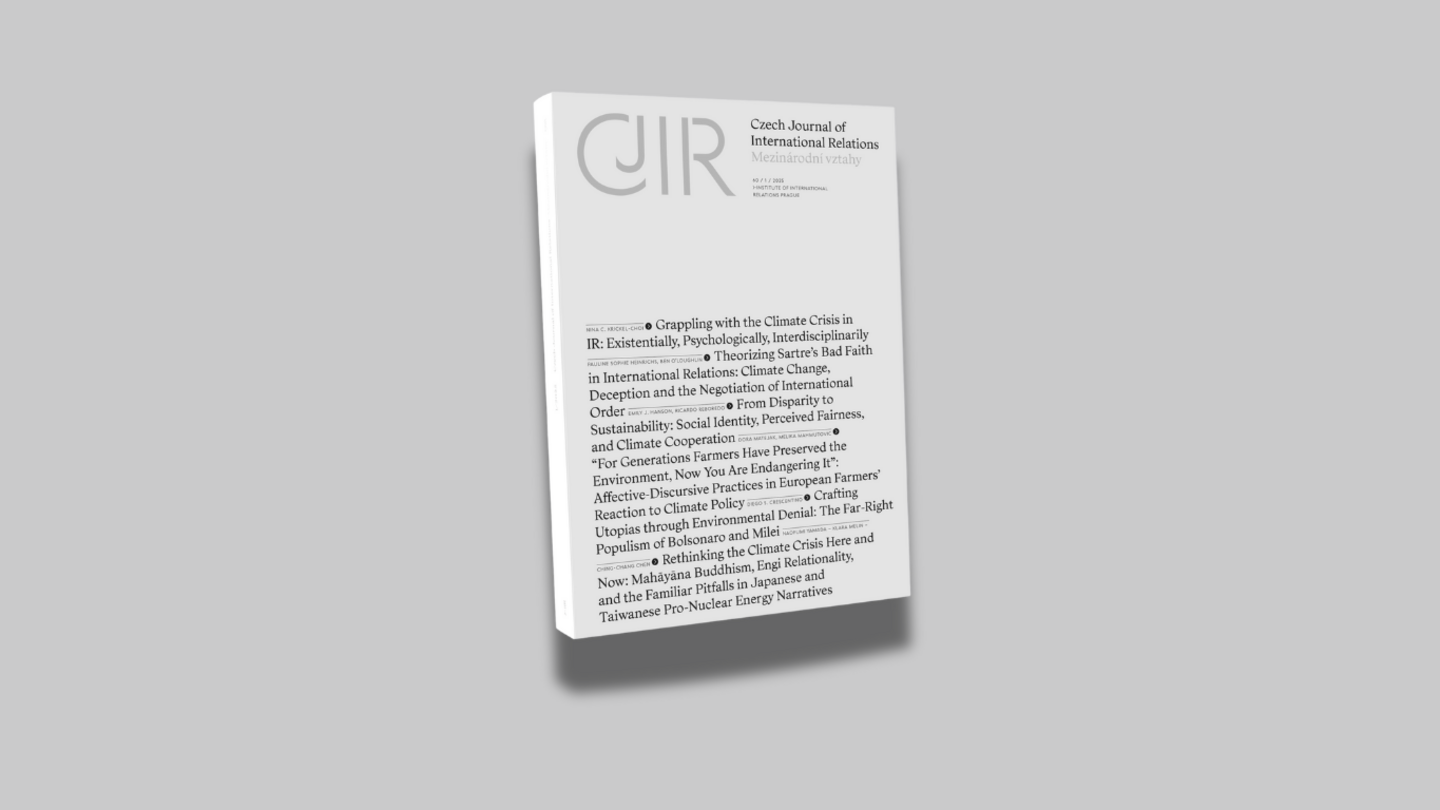Nové vydání časopisu Czech Journal of International Relations (60:1)

The Czech Journal of International Relations is celebrating 60 years of publishing high-quality academic texts! We are marking this milestone with a Special Issue titled Grappling with the Climate Crisis. Guest edited by Nina Krickel-Choi and featuring five interdisciplinary articles exploring how International Relations can better engage with climate change by drawing on insights from psychology, affect theory, and non-Western thought.
Dear readers,
We are celebrating 60 years of the Czech Journal of International Relations! Since its first publication as the Czech-language magazine Mezinárodní vztahy, the CJIR has developed into a globally relevant journal. We start the next decade with a Special Issue (60:1) titled Grappling with the Climate Crisis that offers six articles and a book review.
The Special Issue departs from the proposition that International Relations as a discipline has not done the best job of accounting for the role of climate change in international politics, because it has not sufficiently appreciated the insights of other social science disciplines—most notably, psychology. To address this, the issue offers an extensive editorial and five interdisciplinary research articles engaging with contemporary IR debates.
The editorial was written by Nina C. Krickel-Choi (Lund University), who also served as the guest editor for the entire issue. It introduces the disciplinary problems of IR and discusses a way forward by drawing on related traditions from existentialism and psychology. The first article of the issue, by Pauline S. Heinrichs (King’s College London) and Ben O’Loughlin (Royal Holloway, University of London), is titled Theorising Bad Faith in International Relations: Climate Change, Deception and the Negotiation of International Order. The text examines how climate-vulnerable states charge major carbon emitters with bad faith behaviours, how those emitters respond in ways that often confirm such accusations, and what vulnerable states propose as policy alternatives.
Emily Hanson (Charles University) and Ricardo Reboredo (Metropolitan University Prague) link IR with psychology in their article From Disparity to Sustainability: Social Identity, Perceived Fairness, and Climate Cooperation, exploring how IR can benefit from social identity theory.
Diego S. Crescentino (Dueste University) investigates how utopias play a role in populist visions, using the cases of Brazilian and Argentinian presidents Jair Bolsonaro and Javier Milei. His article is titled Crafting Utopias through Environmental Denial: The Far-Right Populism of Bolsonaro and Milei.
Dora Matejak and Melika Mahmutovic (both University of Ljubljana) analyse farmer protests against the EU to explore the role of emotions such as anger and fear in the process—in their article titled “For Generations, Farmers Have Preserved the Environment, Now You Are Endangering It”: Affective-Discursive Practices in European Farmers’ Reaction to Climate Policy.
Finally, Naofumi Yamada (Ritsumeikan University), Klara Melin (Stockholm University), and Ching-Chang Chen (Ryukoku University), in their article Rethinking the Climate Crisis Here and Now: Mahāyāna Buddhism, Engi Relationality, and the Familiar Pitfalls in Japanese and Taiwanese pro-Nuclear Energy Narratives, show how non-Western concepts such as engi can help overcome familiar epistemological challenges in climate campaigns.
Outside of the thematic texts, the issue offers a book review of Stefan Auer’s European Disunion: Democracy, Sovereignty and the Politics of Emergency, written by Jana Vargovčíková (INALCO Paris).
Dear readers, we hope you will find the issue intellectually stimulating.
Pleasant reading,
Michal Kolmaš, CJIR Editor-in-Chief






